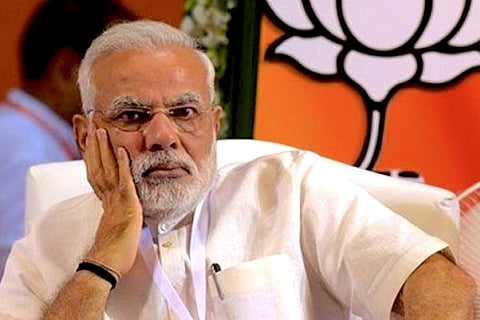

The road to being ‘woke’ is hard. As much as one tries, it’s hard to unlearn that which is part of our everyday language and outlook. Particularly when it comes to ableism – there are words and phrases that we may not even know have roots in ableist stereotypes of incapacity and worthlessness. This road to wokeness is strewn with opportunities to make inappropriate jokes and quips. If you are of the quick retort kind, you’ve been in that situation where there is the perfect set up for an inappropriate joke, the kind that would get college students giggling – think of the plight of poor Chatur doing his infamous ‘balatkar’ speech in 3 idiots. Part of being a ‘better’ person is realising the roots of the humour that comes to mind, and walking away.
Unfortunately, our Honourable Prime Minister could not turn away from the ripe opportunity provided by a young participant of the Smart India hackathon at IIT Kharagpur, who was passionately describing her solution to help dyslexic persons. As part of her pitch to the Prime Minister, she began describing what dyslexia was. Now, had she used the term divyaang, perhaps the Prime Minister would have understood, as he was the one who had coined the term. But upon hearing about persons who had rather undivine difficulties reading and writing, he could only think of how hilarious it would be to reference one of the BJP’s main campaign platforms, i.e. that the UPA is being led by the bipolar and the pappu, at this golden opportunity. After all, it was also one of the rare unscripted appearances that our Prime Minister has made during the present regime, albeit over video conferencing.
And so he asked if this “idea” could be used for persons between the ages of 40 and 50, which caused several students in the room to erupt into laughter. Having caught the imagination of this group, as the laughter died down, the Prime Minister observed that the mothers of these children would be extremely happy with this “solution”, because why just limit oneself to insulting one leader when you have a captive audience over video conferencing?
Now what exactly was this solution? Such was the Prime Minister’s eagerness to make this quip that it eclipsed the idea that this student was putting forth. As a result, we had no idea what the solution to the problem was. The only media – be it mainstream or social – takeaway from the Hackathon is a Prime Minister who heard about people with learning disabilities and could only think of how funny it would be to use that descriptor to denigrate his political rivals.
It is disappointing that disability is still a laughing matter for political leaders in India. Perhaps they place too much reliance on the Census figures of 2.1% of the population having a disability, and not enough faith in the WHO/UN estimates that the number is likely closer to 10-15% of the population. Perhaps they forget that these persons have friends and families who value leaders who treat disability as part of human diversity and not as an insult. And there are many who would value approaches to disability being focused on action over optics, and unfortunately, there has been too much of the latter in the recent past.
Public discourse gets quite ugly especially around election time, but it is time to expect more from politicians who seek approval based on their levels of progressiveness. For what it is worth, this is the video of the hackathon, with Diksha Haryal from Uttarakhand, who is pursuing her B.Tech from the University of Petroleum and Energy Studies, presenting the team effort around early identification of dyslexic children. Haryal appears to recover from the intervention and the rest of the presentation of the team goes off without any political potshots. The idea and solutions being put forth do not get the discussion and recognition they deserve, and politicians would be advised to leave politics at the door when it comes to opportunities like this.
Performative empathy is no longer an option – there’s a significant and growing section of the population who are ready to hold their leaders accountable for their actions and inactions when it comes to disability and mental health, as can also be seen from recent campaigns being launched in the run up towards elections. It’s impossible to imagine state policy on destroying stigma against persons with disabilities working in a situation where leaders freely use ableist insults against each other.
It’s time for our leaders to mind their language when it comes to actual or perceived disabilities of their political rivals – or else, in time, the joke might be on them.
Amba Salelkar is lawyer working on gender, disability, and mental health inclusion based in Chennai. The opinions expressed herein are her own.